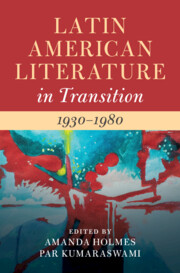Book contents
- Latin American Literature in Transition 1930–1980
- Latin American Literature in Transition
- Latin American Literature in Transition 1930–1980
- Copyright page
- Contents
- Contributors
- Introduction
- Part I War, Revolution, Dictatorship
- Part II Metropolis and Ruins
- Part III Solidarity
- Part IV Aesthetics and Innovation
- Index
Chapter 1 - Revolutions and Literary Transitions: The 1960s
from Part I - War, Revolution, Dictatorship
Published online by Cambridge University Press: 24 January 2023
- Latin American Literature in Transition 1930–1980
- Latin American Literature in Transition
- Latin American Literature in Transition 1930–1980
- Copyright page
- Contents
- Contributors
- Introduction
- Part I War, Revolution, Dictatorship
- Part II Metropolis and Ruins
- Part III Solidarity
- Part IV Aesthetics and Innovation
- Index
Summary
The decade of the 1960s provoked a specific interest in Latin America and its literature, largely owing to the impact of the Cuban Revolution and the attention it paid to the struggle in the cultural field. If until that point the continent’s great writers were perceived as isolated figures, the new context after 1959 created the conditions for them to be read as part of a group that was committed to the common duty of putting a new face on Latin American literature. In fact, the so-called Boom cannot be understood without considering the specific political context that acted as its sounding board. An intrinsic part of the atmosphere at the time, then, were heated debates that foregrounded the role of the intellectual in society, intense polemics regarding the limits of freedom of expression under socialism, and fiery conflicts about the status of literature in a revolutionary society. Paradoxically, the very same period was also seen by its protagonists as one of transition toward a new, as yet undefined, stage. If the decade of the 1960s was dominated by left-wing thought and by the idea of the continental revolution, the 1970s meant the withdrawal of the left, and a gradual rise for the right. In its own way – always and naturally tangentially – literature has narrated all those transitions.
Keywords
- Type
- Chapter
- Information
- Latin American Literature in Transition 1930–1980 , pp. 17 - 31Publisher: Cambridge University PressPrint publication year: 2022

